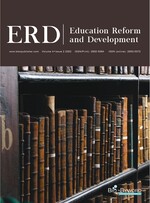Abstract
The iterative progress and maturity of computer technology have enhanced the interactivity and teaching effect of University English. Through technology, personalized analyses of students’ learning characteristics can be effectively carried out, and teaching can be conducted according to students’ personalized learning characteristics. In this paper, the “guidance control-interaction” University English teaching mode is first analyzed, followed by an exploration of the practice of this teaching mode based on big data. Lastly, teaching practice strategies in relation to this teaching mode are proposed.
References
Dong M, 2004, A Preliminary Study of “Student-Student Interaction” Model in University English Classroom. Foreign Languages and Foreign Language Teaching, 2004(5): 31–33.
Ge J, Chen M, Shen Y, 2008, The Idea of the “Three in One” New Teaching Mode for the Reform of University English Teaching Under the Concept of Elite Education. Journal of Beijing International Studies University, 2008(10): 45–50.
Luo J, 2020, Blended Instructional Design from the Perspective of TPACK: A Case Study of Public English Course in Higher Vocational University. Popular Literature and Art, 2020(8): 145.
Sun S, Xu L, 2014, Research on the Cultivation of Computer-Based Intercultural Competence in University English Teaching. Foreign Language Circles, 2014(04): 91.
Tang S, 2013, The Balance and Interaction of Language Input and Output: The Motivation and Operability of the Classroom Mode of University English Teaching. Foreign Language Teaching Theory and Practice, 2013(03): 22.
Wang N, Zhang J, 2018, Reflection on the Deep Integration of Information Tech and Foreign Language Teaching – Practice of University English Classroom Teaching Reform Based on Tech Integration. Audio Visual Foreign Language Teaching, 2018(10): 3–5.
Xu J, Liu W, 2019, Innovative Foreign Language Teaching and Research in the Context of Information Tech. Foreign Languages and Foreign Language Teaching, 2019(5): 125.
Zhang T, 2010, New Vision and New Thinking of University English Teaching Reform Research – Also on the Integration of Computer Network and Foreign Language Curriculum. Audio Visual Foreign Language Teaching, 2010(05): 37–40.
Zhong X, Song S, Hu M, et al., 2015, The Construction of Smart Education Ecology in the Perspective of the Fourth Education Revolution. Journal of Distance Education, 2015(4): 34–40.
Zhou J, Fan W, Lei X, 2003, Stepping Out of Traditional University English Teaching Mode and Improving Students’ Ability to Use English in An All-Round Way. China University Teaching, 2003(3): 22–24.
Han X, 2016, Teaching Design Based on Problem-Centered Teaching Model. Chengdu Vocational and Technical College Vocational Education Research, 2016(004): 17–20.
Xu J, 2005, Practice and Discussion of “Guide-Control-Interaction” University English Teaching Method. Contemporary Education Forum: Macro Education Research, 2005(05X):113–115.
Ge J, Chen M, Shen Y, 2008, On the Reform of University English Teaching Under the Concept of Elite Education – The Construction of “Trinity” New Teaching Mode. Journal of Beijing Second University of Foreign Chinese, 162(10): 45–50.
Guo Z, Zhu R, 2011, Exploration and Practice of Teaching Method Reform of University English Course. Journal of Hetian Normal College, 2011(05): 28–35.
Guo R, 2018, Practice and Exploration of “Process Assessment Model” in College English: A Case Study of Xi’an Peihua College. Yangtze River Series, 2018(16): 151.
